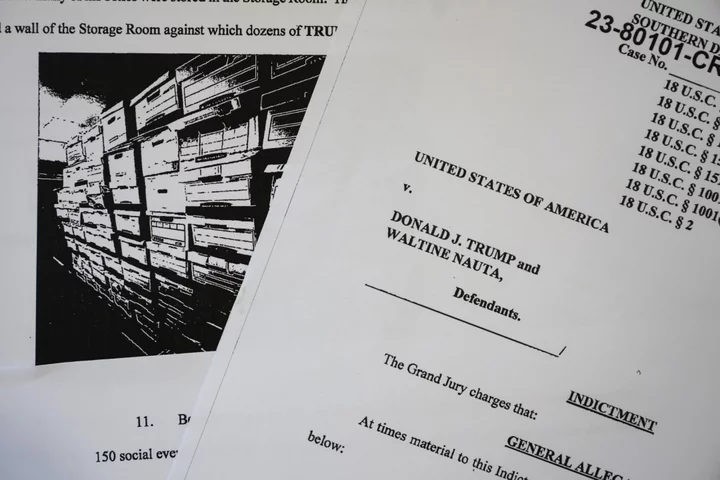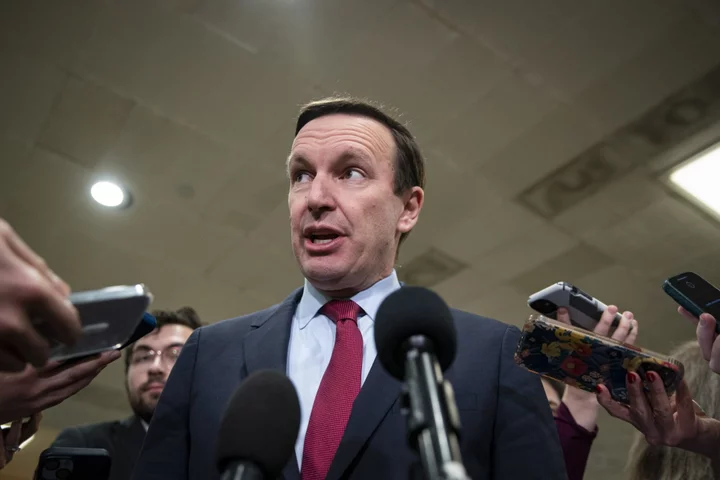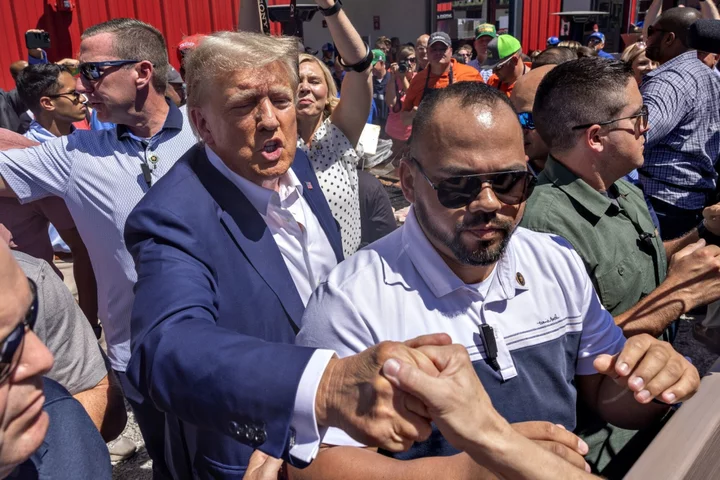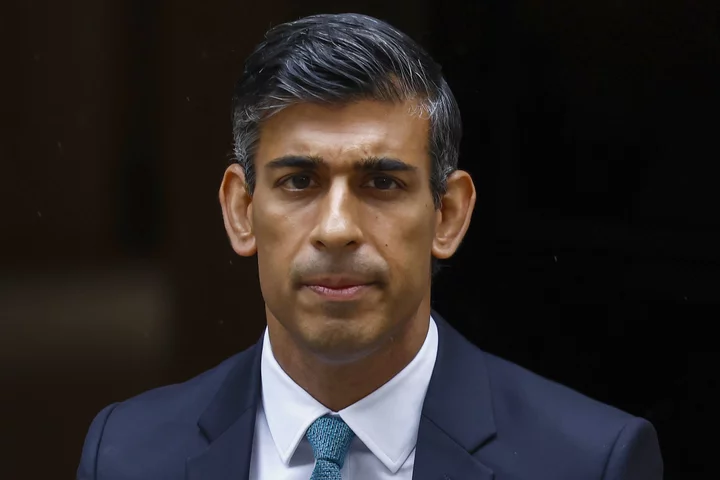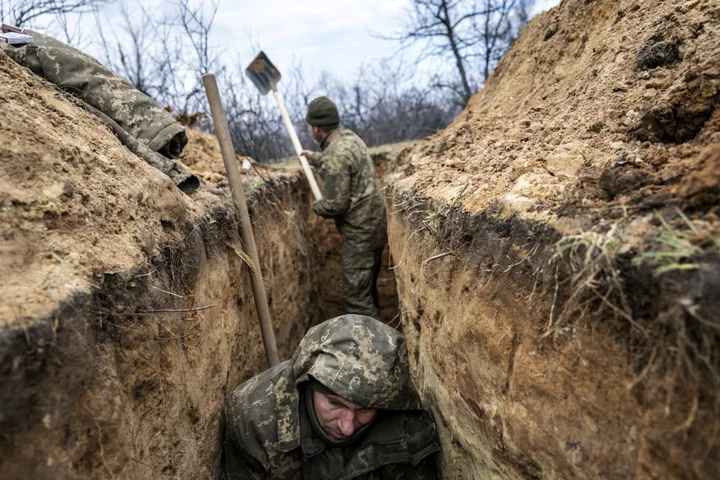The Justice Department is on a tight timetable to work out conditions for using classified information in the upcoming trial against Donald Trump, a crucial process that the former president could use to help drag out the proceedings until after the November 2024 presidential election.
Special Counsel Jack Smith has already reached an agreement with US intelligence agencies to use up to 31 documents containing national defense information that are at the core of the case against the former president, according to two people familiar with the case who asked to remain anonymous speaking about the confidential matter.
Smith’s team said in a Wednesday court filing that it’s handed over the first set of unclassified discovery materials to Trump’s lawyers, meaning one of his next moves will be how to deal with the classified information.
Judge Aileen Cannon issued an order Tuesday for the criminal trial to begin Aug. 14, though that’s likely to change once the defense lodges any challenges to the indictment or the court proceedings.
Spokespeople for Smith and Trump’s lawyers declined to comment.
Trump is accused of unlawfully holding on to sensitive national security information after he left the White House in January 2021 and of obstructing the government’s efforts to identify and retrieve the records. He pleaded not guilty in a Miami federal courtroom June 13 to charges he mishandled state secrets.
Decisions over which classified documents will be used in court and how they will be referred to — say through redactions or summaries — must be worked out between prosecutors and the judge before the trial can begin. Smith has asked for a speedy trial, putting the case on a 70-day schedule, as Trump steps up his 2024 presidential campaign.
Trump and his legal team can fight the procedures for using classified documents and other matters, such as objecting to the use of summaries, demanding access to information during discovery or threatening to make public material the government wants to keep secret.
The Justice Department has to designate what classified documents it wants to use, while the judge decides what’s admissible and works with prosecutors to establish appropriate protections. Prosecutors must get final approval from the intelligence agencies that own the documents, based on what the judge decides.
Trump’s lawyers should “push to have access to everything that was taken because it could very well be that there is information in other documents that could be related to the information that they’re charging on,” said Mark Zaid, a national security lawyer based in Washington who has represented hundreds of cases involving intelligence officers, federal employees and whistleblowers.
For example, they might seek to use other classified information during the trial, which prosecutors would have to decide how to handle. Although the indictment charges Trump with illegally retaining 31 documents, the Justice Department alleges the former president had hundreds of documents with classified markings at his Florida resort after leaving the White House.
As part of the order, Cannon directed the Justice Department and Trump’s legal team to determine whether a delay is needed to work out security clearance issues and “any anticipated impact” under the Classified Information Procedures Act. The 1980 statute establishes pre-trial, trial and appellate procedures for criminal cases involving the use of classified information.
“The government has gamed this all out. Their contingency plans have contingency plans,” said David Aaron, a former federal prosecutor and intelligence attorney, who believes the Justice Department is prepared to handle any surprises that come during pre-trial motions dealing with classified information.
Even if the government decides not to use some of the documents Trump is charged with possessing, convicting Trump on just one of them carries up to a 10-year prison sentence, though Trump is unlikely to face the maximum penalty if convicted, said Aaron, a senior counsel at the Perkins Coie LLP law firm.
Aaron wrote an extensive analysis of how secret evidence is used in public trials. He cited, for example, the prosecution of ex-CIA officer Kevin Patrick Mallory, who was found guilty at trial of conspiring to provide classified information to a foreign country.
Mallory appealed his conviction on grounds that the court violated his right to a public trial by allowing the so-called “silent witness rule” during his trial, which is a means to disclose classified evidence only to a judge, the jury, counsel and witnesses but not the public. The US Court of Appeals for the Fourth Circuit denied his appeal last July.
“There are several moments in each of these cases where the defendant doesn’t think the government will be able to move forward, and the government proves the defendant wrong,” Aaron said.
The pre-trial battles and rulings by Cannon will have enormous consequences, as missteps by federal prosecutors could damage their case, while Trump and his lawyers likely will try to tangle up the government and delay the trial beyond the 2024 presidential election, Zaid said.
But the Classified Information Procedures Act also allows the Justice Department to quickly appeal adverse rulings, said Joyce Vance, a former US Attorney for the Northern District of Alabama.
The appeals court, which in the Trump documents case is the US Court of Appeals for the Eleventh Circuit, is required to expedite a hearing, which is intended to keep the trial moving and prevent mischief by a defendant, Vance said.
“They can only create as much chaos as the 11th Circuit allows them to cause,” said Vance. “My money is on the 11th Circuit to be even handed.”
--With assistance from Zoe Tillman.

